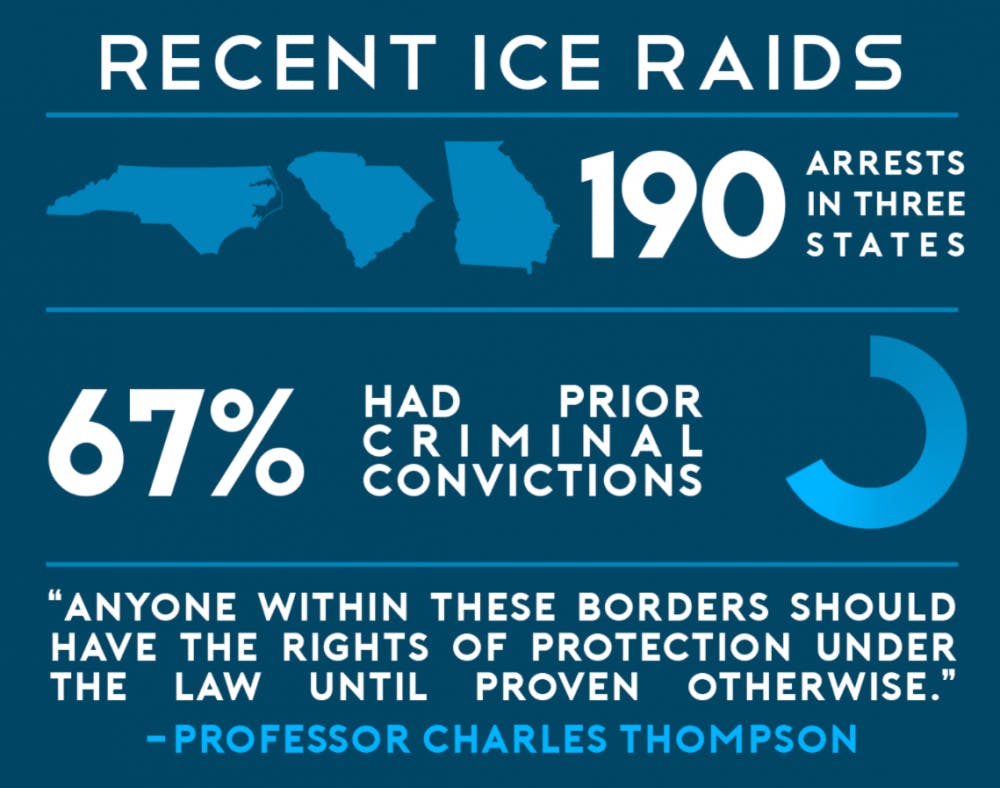In recent days, immigration enforcement efforts have led to U.S. Immigration and Customs Enforcement raids across the nation, including the arrest of approximately 190 people in North Carolina, South Carolina and Georgia.
Although similar ICE raids were conducted under the Obama administration in years past, President Donald Trump’s policies regarding immigration have made these raids particularly high-profile. Last week, the Department of Homeland Security expanded the number of people it considers priorities for deportation, leading to heightened fear in immigrant communities.
“I think that there is a greater panic because it happened in so many different places across the country at the same time,” said Felicia Arriaga, a Duke graduate student who was involved in the #DukeSanctuary movement. “I think there was an immediate response for folks to cover it because I think folks were expecting there to be something like this to be occurring.”
Li-Chen Chin, assistant vice president for intercultural programs, said Duke has taken several steps to support its students and re-evaluate its current practices in light of recent events.
Most notably, Chin and colleagues at the Office of Undergraduate Financial Aid have arranged for students protected under the Deferred Action for Childhood Arrivals program to work with an immigration attorney in Raleigh. She noted that because not all undocumented students qualify for DACA, the University will tailor its support to each student.
Within the U.S. Department of Homeland Security, ICE focuses on trade, customs and immigration with the official goal of protecting public safety and homeland security.
According to ICE, the recent operations focused on arresting “immigration fugitives, re-entrants and at-large criminal aliens.” An agency press release states that of the 190 people arrested in the Carolinas and Georgia, 127 had “prior criminal convictions.”
However, many fear that the scope of the raids may broaden to include undocumented immigrants who are peaceful and otherwise law-abiding.
“One of the things the new administration has said is that they want to reinstate two programs that requested local law enforcement to assist them in enforcing federal immigration laws,” said Lynn Calder, an immigrant law specialist and senior lecturing fellow at the Law School. “Local law enforcement has, for the most part, had a little problem with that because they’re concerned about trust in the immigrant communities. They need a good relationship in those communities, and they don’t want to be feared as someone who’s going to come in and enforce federal immigration laws.”
Calder explained that the priorities held by the Obama administration have shifted under President Donald Trump. Previously, immigration enforcement was only supposed to focus on specific groups of undocumented immigrants, particularly those with serious criminal convictions.
She noted that under new guidelines released last week, however, a much larger group is being targeted, including people who have been criminally charged but not yet convicted. Calder explained that in North Carolina, some traffic offenses are misdemeanors, which are considered minor crimes. This means it is possible for an undocumented immigrant stopped for a traffic offense to end up facing deportation proceedings.
“One of the tools of immigration enforcement is causing fear so that folks will not continue and go on with their lives,” Arriaga said. “And to also make people so fearful that they also maybe even choose to self deport.”
Charles Thompson, a professor of the practice of cultural anthropology and documentary studies, emphasized that these policies affect the broader community—not just undocumented immigrants.
“Any time we have someone who’s afraid of our country, then we have failed,” Thompson said. “My understanding is, anyone within these borders should have the rights of protection under the law until proven otherwise.”
Thompson suggested that Duke community members reach out to undocumented students or students with undocumented family members.
“Support them, and let them know that here, where I stand, we stand for justice,” Thompson said. “We begin there and build circles of support, and hopefully we can do this as a campus, we can do this as Durham, and then we just go from there.”
Get The Chronicle straight to your inbox
Signup for our weekly newsletter. Cancel at any time.

